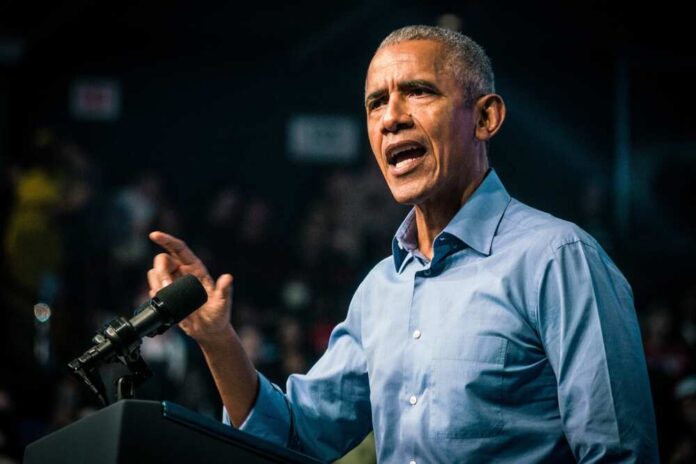
Former President Barack Obama steps up to rally Black men behind Kamala Harris’s presidential campaign, addressing concerns and urging support in key battleground states.
At a Glance
- Obama campaigns for Harris to boost her support among Black voters, especially men
- Black male voters emerge as a crucial swing vote in battleground states
- Harris faces challenges in conveying a message of change while part of the incumbent administration
- Innovative outreach efforts aim to engage traditionally disengaged Black male voters
Obama’s Endorsement and Campaign Efforts
Former President Barack Obama has thrown his weight behind Vice President Kamala Harris’s presidential campaign, aiming to revitalize support among Black voters, particularly men. Obama’s involvement comes as Harris faces a noticeable lag in enthusiasm from African-American communities compared to the turnout generated during Obama’s own elections. The former president’s endorsement and campaign efforts are seen as crucial in battleground states where Black men are emerging as a key swing vote.
Have no fear, @BarackObama is here…. to mansplain @KamalaHarris to the country. Obama thinks Kamala’s “plateaued” and behind the scenes, he’s saying Kamala’s losing the black vote. After Harris couldn’t hit a single pitch in any of her softball interviews, the Obamas and the… pic.twitter.com/pCwkH8rmPV
— Jesse Watters (@JesseBWatters) October 11, 2024
Obama’s support is not just symbolic; it’s strategic. His campaign appearances are designed to reignite the “hope and change” message that propelled him to victory in 2008. This approach is particularly important as Harris grapples with the challenge of presenting a fresh vision while being part of the incumbent administration.
Innovative Outreach to Black Male Voters
Recognizing the critical role of Black voters in securing victory, Harris’s campaign is employing innovative strategies to engage Black men who have traditionally been disengaged from the political process. The Black Male Voter Project, for instance, hosted the “No Cap Conference” in Atlanta, featuring rap battles and seminars on election misinformation and voting rights history.
“It’s called No Cap. No cap, in a young Black man’s language, means ‘no lies. This is the truth,” Mondale Robinson, the organization’s founder, told ABC News Chief National Correspondent and “Nightline” Co-Anchor Byron Pitts.
These efforts aim to address what some see as a disconnect between traditional campaign tactics and the realities of marginalized Black male voters. Robinson emphasizes the importance of direct engagement, stating, “We talk to the brothers that the world doesn’t want to talk to. Nobody’s doing that.”
Challenges and Criticisms
Despite these efforts, Harris’s campaign faces challenges in connecting with Black voters, particularly in crucial states like Michigan. Some Black leaders in Detroit have expressed concerns that the campaign’s approach can be patronizing and lacks direct engagement with influential community figures. This criticism highlights the delicate balance Harris must strike between leveraging her identity and addressing substantive policy concerns.
BREAKING NEWS: @BarackObama sent out by White liberals to “Blackman-splain” to get Black men to vote for @KamalaHarris. Wait, his mother and Kamala’s mother are both “WHITE.”
Obama doesn’t even have Black neighbors, and 99% of his handlers are White.
I don’t have anything in… pic.twitter.com/0cb5WEr0hs
— Vernon Jones (@VernonForGA) October 11, 2024
“There’s enormous nostalgia for Barack Obama, not least among Black voters. From that perspective, Obama going on the campaign trail for Harris can only help her, especially as Harris tries to revive Obama’s 2008 optimism with a message of ‘hope and change.'” – Thomas Gift, an associate professor of political science and director of the Centre on U.S. Politics at University College London
However, not everyone views Obama’s involvement positively. Critics, including Trump’s campaign, argue that relying on Obama reflects Harris’s inability to connect with voters independently. The Trump campaign has been actively courting Black voters, presenting an additional challenge to Harris’s outreach efforts.
The Road Ahead
As the campaign progresses, Harris is working to appeal not only to Black voters but also to working-class white voters and other constituencies like Muslim and Arab Americans. Her economic plan, including a $50,000 credit for starting a business, is being highlighted as a key appeal to Black men. The success of these efforts, combined with Obama’s support, could be crucial in determining the outcome in battleground states and, ultimately, the election.
The challenge for Harris remains clear: she must energize Black voters, particularly men, while addressing broader concerns about economic opportunity and social justice. As Obama lends his voice to her campaign, the coming months will reveal whether this strategy can recreate the historic turnout that propelled Democrats to victory in previous elections.














